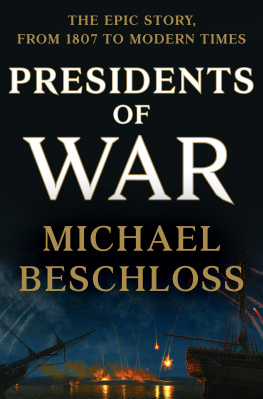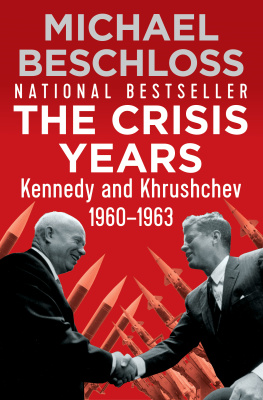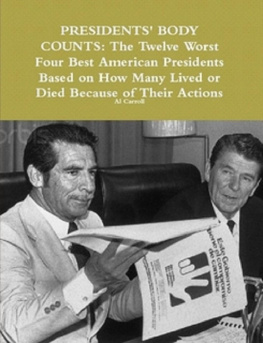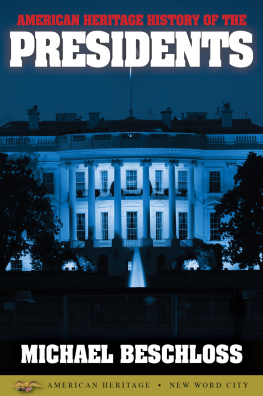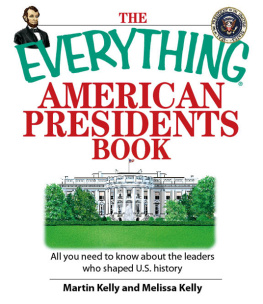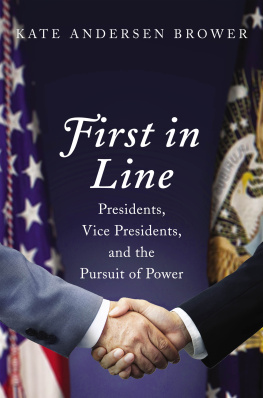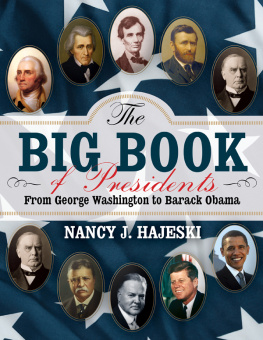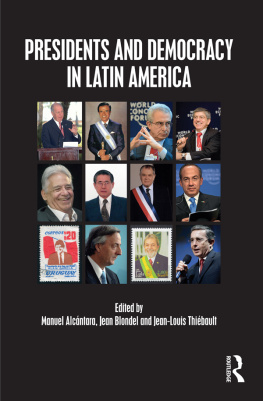Acknowledgments
When I started this book, I did not expect it to take more than a decade to research and write. I soon discovered, however, that coming to understand the leadership of Presidents in times of war required almost the same depth of research as if I were writing an entire book on each of them.
For specific counsel during this books long journey, I thank Jim and Kate Lehrer, Mary Graham, Susan Dunn, David Sanger, and Evan Thomas. Jon Meacham advised me on all aspects of research, writing, and publication. My Williams College teacher, James MacGregor Burns, died in 2014, at the age of ninety-five. For four decades, he helped me to refine the theme and scope of much of what I have written, all the way back to my first book, which started as my college honors thesis, written under his supervision. Any shortcomings in this volume are in spite of Jims wise advice and noble example.
Early in this project, Margaret Shannon and Justin Reynolds helped to locate a number of published materials. Milton Djuric examined an archive from the McKinley period. Michael Hill searched several manuscript collections from the Jefferson-Madison era and, at the end of the process, checked my Source Notes. Jack Bales helped to compile the bibliography. Dani Holtz recommended a number of journal articles and helped with endnotes. Julie Tate fact-checked the entire book.
I have performed research in presidential libraries since the mid-1970s, when John Kennedys aide and friend David Powers kindly showed me through the temporary quarters of the Kennedy Library. For the period I worked on this book, I thank David Ferreiro, Archivist of the United States, Cynthia Koch and Paul Sparrow of the Roosevelt Library, Michael Devine of the Truman Library, and the Johnson Librarys Mark Updegrove, Tina Houston, Claudia Anderson, and the late Harry Middleton, as well as LBJs White House aides Tom Johnson and Larry Temple, both now trustees of the Lyndon B. Johnson Foundation.
I am grateful to historians who generously read chapters of the book in manuscript and proof for errors of fact or interpretation. They include David Mattern, of the University of Virginia, who read the chapters on James Madison; Robert Merry on James Polk and William McKinley; Allen Guelzo, of Gettysburg College, on Abraham Lincoln; John Milton Cooper, of the University of Wisconsin, and Margaret MacMillan, of St. Antonys College, Oxford, on Woodrow Wilson; David Kennedy, of Stanford University, on Franklin Roosevelt; H. W. Brands, of the University of Texas, on Harry Truman; and Fredrik Logevall, of Harvard University, on Lyndon Johnson. John A. Farrell, biographer of Richard Nixon, provided additional advice. Corby Kummer of the Atlantic read and commented upon the final proofs of the entire volume.
At Crown Publishing, I thank Molly Stern for her wisdom and strong support for this project, as well as Maya Mavjee for her leadership. David Drake provided important advice. Tim Duggan has been a superb editor, aided by Will Wolfslau and Aubrey Martinson. Julie Cepler, Becca Putnam, Rachel Rokicki, and Gwyneth Stansfield have been a pleasure to work with. Chris Brand and Songhee Kim ensured the aesthetics of the book, inside and out. Cindy Berman, Heather Williamson, and Maureen Clark guided it through production. For their early support, I thank Tina Constable and Sean Desmond.
Esther Newberg has been my friend and literary adviser for twenty-five years, through six books, and brought to this one her intense attention, judgment, and verve. At ICM, I also benefited from the work of John Delaney, Kari Stuart, Zoe Sandler, and Alexandra Heimann. I am grateful to my lawyer and friend Michael Rudell and his colleagues Neil Rosini and Eric Brown. My assistant Sarah Convissor was helpful in many ways.
When I began working on this book, my son Alex was in the ninth grade and my son Cyrus in the sixth. Eleven years later, Alex is now a medical student at the University of Pennsylvania and Cyrus is a history major at Williams College. They are both great guys and, while (usually) tolerating the distractions of their fathers labors on this volume, gave me advice of a quality that went far beyond their ages. What their mother, Afsaneh Mashayekhi Beschloss, has brought to the life of this author is inexpressible.
Michael Beschloss
Washington, DC
June 2018
ALSO BY MICHAEL BESCHLOSS
Kennedy and Roosevelt: The Uneasy Alliance (1980)
Mayday: Eisenhower, Khrushchev and the U-2 Affair (1986)
The Crisis Years: Kennedy and Khrushchev, 19601963 (1991)
At the Highest Levels: The Inside Story of the End of the Cold War (with Strobe Talbott, 1993)
Taking Charge: The Johnson White House Tapes, 19631964 (1997)
Reaching for Glory: Lyndon Johnsons Secret Tapes, 19641965 (2001)
The Conquerors: Roosevelt, Truman and the Destruction of Hitlers Germany (2002)
Presidential Courage: Brave Leaders and How They Changed America (2007)
About the Author
Michael Beschloss was born in Chicago in 1955 and attended Phillips Academy (Andover), Williams College, and Harvard Business School. He has served as a historian at the Smithsonian Institution, a Senior Associate Member at St. Antonys College (Oxford), and a Senior Fellow of the Annenberg Foundation.
His first book, Kennedy and Roosevelt: The Uneasy Alliance (1980), originated as his Williams College honors thesis. Mayday: Eisenhower, Khrushchev, and the U-2 Affair (1986) argued that the spring of 1960 was a turning point in the US confrontation with the Soviet Union. The Crisis Years: Kennedy and Khrushchev, 19601963 (1991) was praised by David Remnick in the New Yorker as the definitive history of John F. Kennedy and the Cold War. Beschloss was the first historian to write books based on Lyndon Johnsons newly opened White House tapesTaking Charge (1997) and Reaching for Glory (2001). These volumes were followed by The Conquerors: Roosevelt, Truman, and the Destruction of Hitlers Germany (2002) and Presidential Courage: Brave Leaders and How They Changed America, 17891989 (2007), both New York Times bestsellers.
Beschloss serves as the NBC News Presidential Historian and a contributor to the PBS NewsHour. He has won an Emmy and six honorary degrees. He has also been awarded the State of Illinoiss Order of Lincoln, the Ambassador Book Prize, the Harry S. Truman Public Service Award, the Founders Award of the Historical Society of Pennsylvania, the New York State Archives Award, and the Rutgers University Living History Award. He is a trustee of the White House Historical Association and the National Archives Foundation, and a former trustee of the Thomas Jefferson Foundation. He is on Twitter at @BeschlossDC.
CHAPTER ONE
Torrent of Passion
The cascade of hostilities that led to the War of 1812 and the burning of Washington had begun a half decade earlier, under President Thomas Jefferson, when an unexpected naval confrontation brought the United States and its estranged British parent to the edge of full-scale war. As Jefferson later mused during his retirement, in a letter to his antient friend and classmate James Maury, The affair of the Chesapeake put war into my hand. I had only to open it, and let havoc loose. Had Jefferson opened his hand, the United States would have waged a War of 1807. But instead his political mastery, his refusal to enter a war unprepared, and his insistence on peace prevented his country from lurching into military conflict.
On Monday morning, June 22, 1807, all was right with the New World, or so it seemed. It was the radiant first dawn of the summer solstice, and the USS

